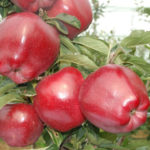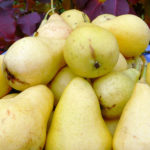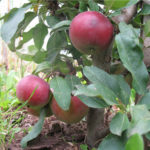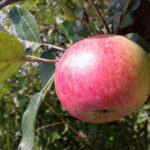Apple variety Maluha (columnar)
The selection of columnar apple varieties has been very active in recent years. In Russia, one of the pioneers in this direction is Doctor of Biological Sciences, Professor V.V. Kichin, who created more than a dozen bright varieties included in the State Register of the Russian Federation. Many gardeners are already familiar with the apple trees Dialog, Arbat, Triumph created by him, but recently a completely new variety has appeared, called Malyukha. It was brought to VSTISP, authors V.V. Kichina, N.G. Morozova and L.F. Tulinova. As parent forms were used Lingonberry and a donor of columnarity KV 103. After variety trials, which lasted since 2008, the novelty was entered into the State Register of Breeding Achievements of Russia (in 2015). The admission region is Central (Bryansk, Ivanovsk, Vladimir, Moscow, Kaluga, Ryazan, Tula and Smolensk regions). The results shown during the test make it possible to cultivate our heroine in a cooler region - in the Urals. The best indicators are shown in the conditions of the Moscow region.
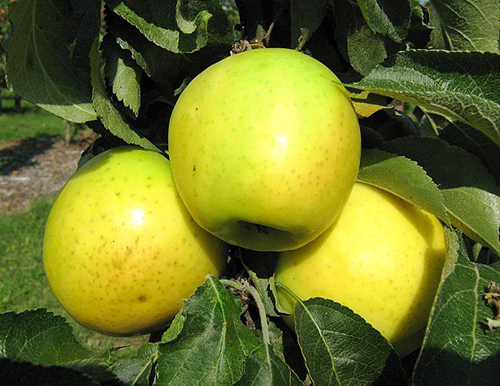
Description
Among the columnar varieties, our heroine is small in stature. The height is about 1.8 meters, but does not exceed two meters. Growth strength is average. The maximum annual growth is about 15 cm. The trunk is strong, with short internodes. The tree has a neat compact habit and belongs to natural dwarfs. During the flowering and fruiting periods, Malyukha looks very decorative, while still remaining a fruit crop. Shoots are short, upright, not very thin, faceted, with brown bark. The foliage is good. The leaves of the apple tree are medium-sized, dark green, wide, elongated, obovate, with a sharp top, a rounded base and a serrate-crenate edge. The surface is smooth, shiny, the nerves are tender. The petiole is long, not thick, uncolored. In May, the tree is covered with amazingly beautiful white flowers. The fruits are evenly distributed throughout the trunk, so harvesting is very convenient.
The fruits of this variety are visually attractive, round-conical in shape. The funnel is sharp-conical, narrow and deep. The saucer is shallow, of medium width, the cup is not very large, closed. The peduncle is straight, short, strong. The skin is thin, but firm, shiny. The main color is light yellow. The State Register notes that there is no cover color. But according to other sources, it is still present in the form of a very faint, blurry red-orange tan on the side of the fruit that was most illuminated by the sun. Subcutaneous points are light, almost invisible, in very small quantities. The pulp has a pleasant creamy color, crispy, medium density, fine-grained, juicy consistency. The aroma is weak, pleasant, sweet-sweet. The taste is excellent, sweet. Malyukha is considered one of the most delicious among the columnar varieties of apple trees; she received 4.8 points for its taste. 100 grams of fresh pulp contains: 16.2% dry matter, 10.6% sugar. There are some discrepancies regarding the size of the fruit. So, the State Register describes apples as small and medium, weighing 64 grams. Other sources describe larger specimens, weighing 200 - 250 grams. Gardeners in video reports show apples that weigh 160 - 180 grams.
Characteristics
- The apple tree has excellent early maturity. The first crop appears already in the second year after planting. But our heroine is capable of blooming already in the year of planting. True, all the flowers will have to be cut off so that the plant spends all its energy on rooting;
- flowers are not afraid of spring frosts. In terms of the strength of flowering, the variety, although inferior to the Amber Necklace, is nevertheless estimated by a five-point system at 3-4 points, depending on the severity of the winter period;
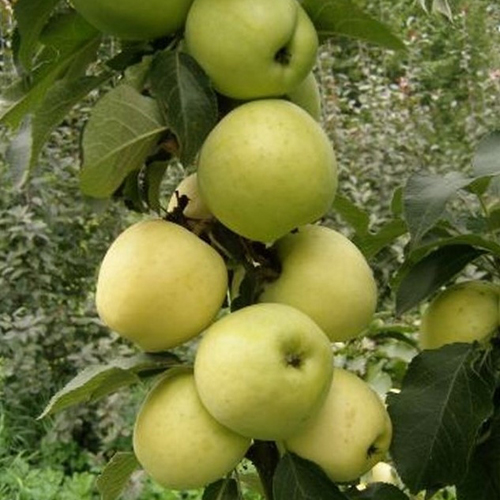
- in terms of ripening, the variety belongs to the autumn. The harvest ripens in mid-September;
- the yield is excellent. But in the first year of fruiting, you should not expect a bountiful harvest from the culture.The indicator in the first 4 - 5 years will be about 4.0 kg or a little more. But starting from the age of five, the tree will bring at least 12-13 kg. According to the State Register, with a planting scheme of 3 × 0.5 m, the average productivity will be 394 c / ha;
- the great advantage of the columnar apple is its stable fruiting;
- the productive period of the tree's life is 15 years, then the lower ringlets dry out and the yield decreases markedly;
- our heroine dispelled the myth about the insufficient winter hardiness of columnar varieties. A small tree in the middle of winter can survive a drop in temperature down to -42 ° C. True, during the test, in the most unfavorable winter of 2005-2006, freezing of bark and wood was 2 points. But if we take the generalized data, then Malyukha can be attributed to one of the most winter-hardy, the average level of freezing of which averaged 0.5 points;
- immunity is not bad. The resistance of the apple tree to the main diseases and pests of the crop is declared. However, there is evidence that in unfavorable epiphytic years, scab damage to leaves can reach up to 2 points;
- during the ripening period, the ovary does not fall off, but it is advisable to remove the ripened fruits on time;
- transportability is good. Excellent keeping quality allows you to lay the crop for storage, until January the marketability of apples does not decrease;
- the way of use is universal. The variety is valued for its taste, so apples are primarily consumed in their natural form. But you can make tasty and healthy preparations from the crop - jam, jam, confiture, filling for baking. The juicy pulp makes excellent juice, fruit drink.
The peculiarity of Malukha is the formation of an apical fruit bud. The fruit that has ripened from it does not allow the shoot to grow and develop normally, because of which it bends. To prevent such a situation, in the spring you should pinch the apical flower bud.
Pollination
In order for the apple tree to show its potential, it needs the right pollinators. Chervonets will perfectly cope with this task, Currency, Chinese woman gold and red. Since the columnar varieties take up little space, you can plant a whole collection of varieties, picking them up according to the flowering time. True, not every gardener can afford such a variety - the prices for such unusual apple trees are quite high.
Planting and leaving
The planting time of a seedling depends on the region. In warm climates, seedlings are best planted in the fall, in cooler climates - in the spring. The crop prefers sunny areas, sheltered from winter winds, and loose and nutritious soil such as loam. Low-lying areas, pits, where excessive moisture can accumulate, fog and cold air stagnate, are categorically unsuitable. The root system of our heroine is located in the upper layers of the soil, so subsoil waters, as a rule, do not threaten her. But on the other hand, watering should be carried out regularly, especially during the hot period. The soil in the near-trunk circle should be moderately moist, its drying out is unacceptable. In order for the root system to be normally supplied with oxygen, it is necessary to loosen in the near-stem circle after each moistening. Fertilization, including foliar dressing, is carried out in the same way as for other types of apple trees.
The baby is good because it has a decorative appearance, compact dimensions and fits perfectly even into a small garden. But the main advantages that attract gardeners in this new variety are its excellent winter hardiness, productivity and taste of the fruit. Apples are perfectly stored and processed. With proper care and adherence to the planting scheme, our heroine will show good resistance to disease, which makes it possible to resort to chemical treatments less often.The only disadvantages of the variety (very subjective) can be considered only the insufficiently long term of the productive life of the apple tree and the need for pollinators.
